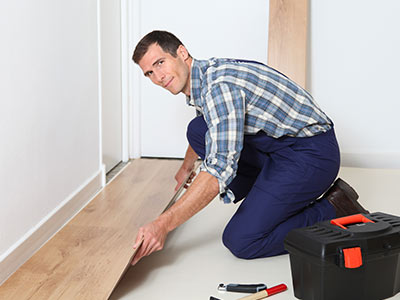Back to Wood Floor Fitting
Flooring Installation: Essential Questions to Ask Your Contractor

When planning to install a new wooden floor, it’s natural to have concerns. It might take some time to decide to invest in this type of flooring, and even longer to choose the perfect option from the vast array of styles, colours, and materials available. However, the next steps are straightforward: you need to purchase the flooring and arrange for its installation. While this may sound easy and stress-free, the reality often hinges on hiring an experienced, knowledgeable, and reliable contractor. Without the right expertise, what should be a smooth process can quickly turn into a nightmare.
Although there are many unreliable contractors in the market, there are also numerous credible and skilled wood floor installation specialists. Your goal is to find the right one for your specific needs. To ensure you hire the best contractor for your wood floor fitting project, it’s crucial to ask all the important questions during the initial inspection. This is an opportunity to gauge the contractor's experience and understanding of your project.
Do I Have to Pay for This Initial Estimate/Assessment?
Asking whether the initial estimate or assessment incurs a fee is important when planning your wood floor installation. Many reputable companies offer free estimates on-site or via phone/email, making it a wise question to pose to potential contractors.
If the contractor informs you that their assessment is not free, ensure you inquire about the exact cost of the estimate. Conversely, if they do offer free estimates, clarify that this will not lead to inflated costs later on during the installation. Transparency is key to maintaining a good relationship with your contractor.
To make an informed decision and potentially save money, consider reaching out to multiple wood floor installation contractors to compare their offers and services. This way, you can find the best value without compromising on quality.
What Type of Flooring Do You Recommend for My Space?
When selecting the right flooring for your space, it's essential to understand the contractor's expertise in various flooring types. A knowledgeable contractor can provide valuable insights into the advantages and disadvantages of different materials, such as hardwood, laminate, vinyl, or tile. Consider discussing the specific requirements of your space, including factors like foot traffic, moisture levels, and aesthetic preferences. Additionally, ask about the durability and maintenance needs of each flooring option. This information will help you make an informed decision that aligns with your lifestyle and enhances the overall look and functionality of your home. By leveraging the contractor's expertise, you can choose the best flooring solution that meets your needs and fits your vision.
What Are the Costs Involved Beyond Installation?
When budgeting for your flooring project, it's crucial to consider the costs beyond just installation. While installation fees are a significant part of the total expense, several other factors can impact your overall budget:
-
Materials: The type of flooring you choose (e.g., hardwood, laminate, vinyl) significantly affects the total cost. Higher-quality materials usually come with a higher price tag.
-
Underlayment: This essential layer helps with sound absorption, moisture control, and cushioning. Depending on the flooring type, the cost of underlayment can vary.
-
Removal of Old Flooring: If you have existing flooring that needs to be removed, this can add to your overall costs. Be sure to ask your contractor if this service is included in the installation fee or if it comes with an additional charge.
-
Additional Fees: There may be other costs involved, such as transportation fees, disposal fees for old materials, or costs associated with any necessary repairs to the subfloor.
By understanding these potential costs, you can create a more accurate budget for your flooring project and avoid any unpleasant surprises down the line. It's always a good idea to ask your contractor for a detailed estimate that includes all these factors before proceeding.
How Should I Prepare My Home for Installation?
Preparing your home for a flooring installation can help ensure the process goes smoothly and efficiently. Here are some essential steps to take before the installers arrive:
-
Clear the Area:
- Remove Furniture: Take out all furniture, rugs, and other items from the room where the flooring will be installed. This includes small items like lamps and decor that might be in the way.
- Create a Clear Path: Make sure there is a clear path for the installers to bring in materials and equipment. This will help them work efficiently and reduce the risk of damaging your belongings.
-
Address Existing Flooring:
- If you have old flooring that needs to be removed, check with your contractor if they will handle this or if you need to arrange it beforehand.
-
Check the Subfloor:
- Ensure that the subfloor is clean, dry, and level. If any repairs are needed, address them before installation day to avoid delays.
-
Manage Climate Conditions:
- Keep the room temperature between 15°C and 27°C before installation. This helps the flooring acclimate properly and ensures better adhesion.
-
Communicate Special Needs:
- If you have pets or young children, inform the contractors in advance so they can take the necessary precautions during the installation.
-
Provide Access:
- Ensure that the installers have access to necessary utilities (like electricity) and bathrooms during the job.
How Long Does the Installation Take?

Asking about the installation timeline is essential, even though there may not always be a straightforward answer. Unforeseen circumstances can arise during the installation process, which may extend the timeline. However, a knowledgeable and experienced wood floor fitting contractor should provide you with a reasonable estimate based on their previous projects.
Understanding the installation duration is crucial because it can significantly impact your overall planning. Knowing how long the installation will take allows you to prepare your home and schedule accordingly.
Additionally, it’s beneficial to contact multiple contractors to gather different estimates. This not only gives you a clearer picture of potential timelines but also allows you to compare their offers comprehensively. A well-informed decision will ensure your project proceeds smoothly and efficiently.
What Happens If Issues Arise During Installation?
Understanding how the contractor addresses unexpected problems during installation is important for ensuring a smooth process. Here are some key points to consider:
-
Communication:
- Immediate Notification: Ensure that the contractor informs you right away about any issues that arise, whether it's related to the flooring materials, the subfloor condition, or any unforeseen complications.
- Open Dialogue: A reliable contractor will maintain open communication throughout the installation process, providing you with updates and options for resolution.
-
Problem-Solving Approach:
- Assessment: The contractor should assess the issue and discuss potential solutions with you. This may involve adjustments to the installation plan, recommending different materials, or modifying the project timeline.
- Flexibility: A good contractor will demonstrate flexibility and a willingness to adapt to the situation, ensuring that your project stays on track despite challenges.
-
Cost Considerations:
- Additional Expenses: Be aware that unexpected issues may lead to additional costs. A reputable contractor will be transparent about any potential extra charges and seek your approval before proceeding with any changes that affect the overall budget.
-
Documentation:
- Written Agreement: It's advisable to have a written agreement outlining how issues will be handled, including any warranties or guarantees related to the work performed. This helps protect both you and the contractor in case disputes arise later.
-
Post-Installation Follow-Up:
- Quality Assurance: After the installation is complete, a reputable contractor will conduct a final walkthrough with you to ensure that all work meets your expectations and addresses any concerns you may have.
Knowing how your contractor handles unexpected issues can provide peace of mind and help you feel confident in your choice. It’s essential to choose a contractor who values customer service and problem resolution, as this can significantly impact your overall satisfaction with the flooring installation.
Is the Contractor Insured and Do They Provide Proof of License?
It is crucial to hire a wood floor installation professional who is fully insured and properly licensed. These credentials are strong indicators of a contractor's legitimacy and reliability. When speaking with potential contractors, don’t hesitate to ask for proof of their license and insurance. A reputable contractor will not only have these documents readily available but will also be glad to provide them. Having a licensed contractor protects you from potential liabilities. In the event of any accidents or damages that occur during the installation process, you want to ensure that you are not held responsible. If a contractor cannot provide proof of their license and insurance, it may be wise to reconsider your choice and look for a more reputable option. By prioritising this aspect, you can ensure that your wood floor installation project is conducted safely and professionally.
Do They Have Workers’ Compensation?
In addition to verifying the contractor’s insurance and license, it’s essential to ensure that they have workers’ compensation coverage. This insurance protects you from being held liable for any on-site injuries that may occur during the installation process. If a contractor does not have workers’ compensation, you could be responsible for medical expenses and other liabilities resulting from injuries sustained by their workers. When discussing your project with potential contractors, make it a priority to ask for proof of their workers’ compensation insurance. A reputable contractor will not hesitate to provide this documentation. By confirming this coverage, you can ensure that you are not only hiring a qualified professional but also safeguarding yourself from potential financial risks.
Is Their Work Under Warranty?
 One of the key indicators of a reliable and reputable wood floor fitting contractor is their ability to offer a warranty for their work. A warranty provides you with peace of mind, knowing that the contractor stands behind the quality of their installation. Most reputable contractors will typically offer at least a one-year warranty on their services, covering any potential issues that may arise after installation.
One of the key indicators of a reliable and reputable wood floor fitting contractor is their ability to offer a warranty for their work. A warranty provides you with peace of mind, knowing that the contractor stands behind the quality of their installation. Most reputable contractors will typically offer at least a one-year warranty on their services, covering any potential issues that may arise after installation.
When discussing your project, be sure to ask about the warranty details, including its duration and what it specifically covers. This information is crucial in ensuring that you are protected in case of unforeseen problems, such as flooring defects or installation errors. If a contractor is unwilling to provide a warranty or hesitates to offer one, it may be a sign to reconsider your choice.
How Long Does the Cleanup Process Last?
The wood floor installation process does not end with the fitting of the floorboards. It often results in a messy and dirty environment due to the use of various materials, tools, and equipment. This means you should anticipate that your property may remain in a less-than-ideal state for several days after the installation is complete. A reputable and reliable contractor will typically include a cleanup service as part of their offering. Be sure to ask about the cleanup process during your initial discussions. Verify how long the cleanup is expected to take and what specific services will be provided. For example, will they remove debris, dust, and leftover materials? Knowing this information in advance can help you better prepare for the post-installation period and ensure that your space is restored to its original condition promptly.
What Maintenance Will My New Flooring Require?
Understanding the long-term care of your flooring is crucial for maintaining its appearance and durability. Here are key maintenance tips tailored to different types of flooring:
-
Regular Cleaning:
- Sweep or Vacuum: Regularly remove dirt and debris to prevent scratches. Use a soft-bristle broom or a vacuum without a beater bar to avoid damaging the surface.
- Mopping: Use a damp mop with a pH-neutral cleaner specifically designed for your flooring type. Avoid excessive water, as it can damage certain materials, especially wood.
-
Preventative Measures:
- Rug Placement: Use area rugs in high-traffic areas to protect the flooring from wear and tear.
- Furniture Pads: Attach felt pads to the bottom of furniture legs to prevent scratches and dents when moving items.
-
Humidity Control:
- Moisture Levels: For hardwood and laminate floors, maintain indoor humidity levels between 30% and 50% to prevent warping and gaps. Consider using a humidifier or dehumidifier as needed.
-
Prompt Repairs:
- Address any scratches, dents, or stains immediately. For hardwood floors, consider using a touch-up kit or refinishing the affected area as needed.
-
Periodic Professional Maintenance:
- Schedule periodic professional cleaning and maintenance. This can include deep cleaning, refinishing, or resealing, depending on the flooring type.
By understanding the specific maintenance requirements for your new flooring, you can make an informed decision and ensure it remains beautiful and functional for years to come. Regular care and attention will extend the life of your investment and enhance the overall look of your home.